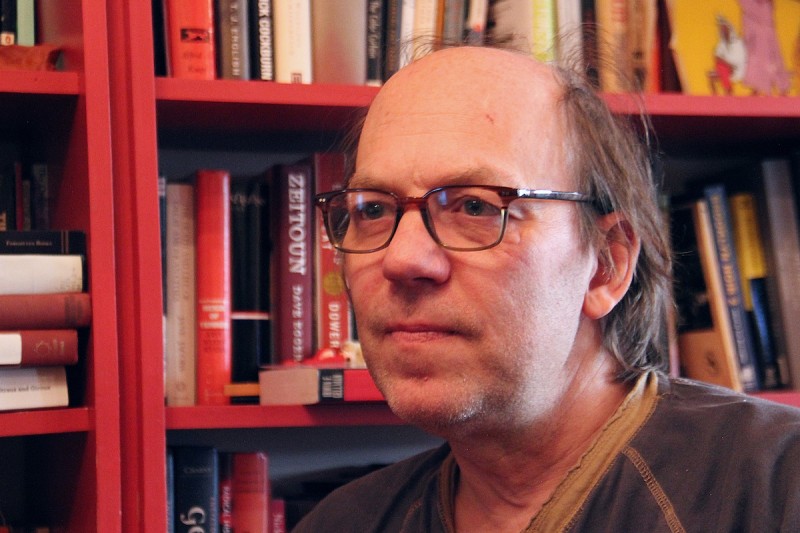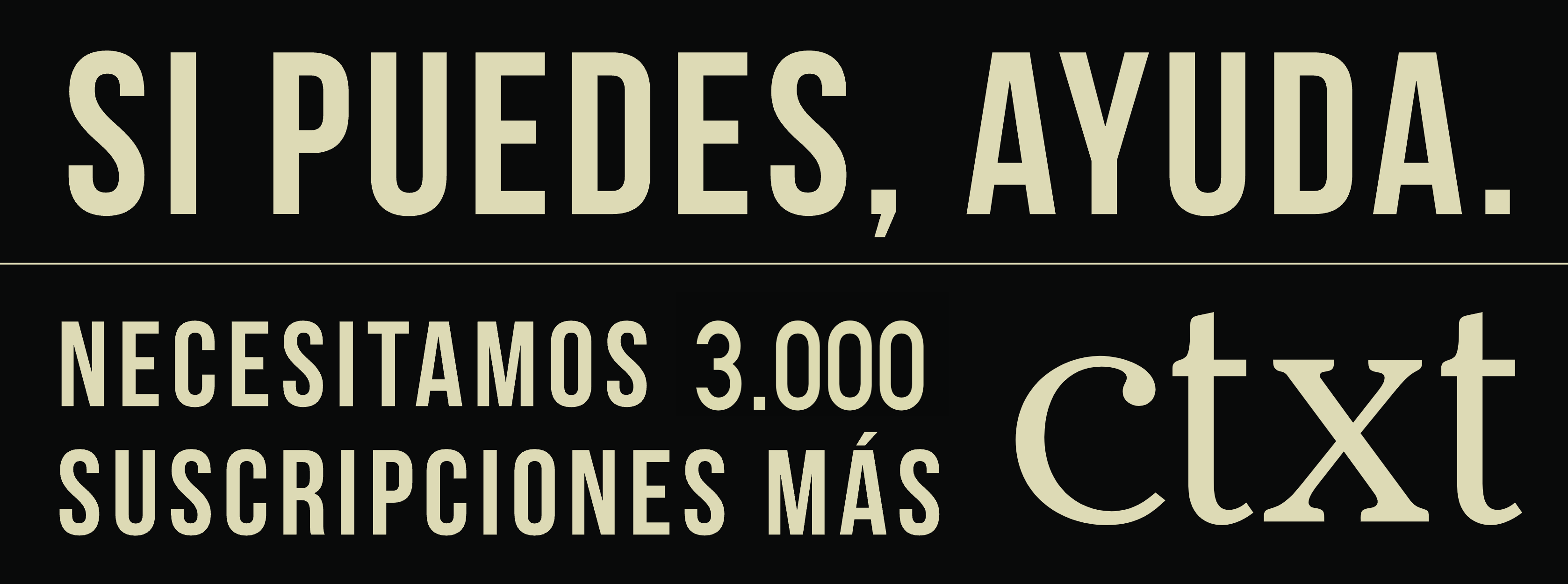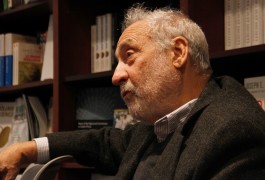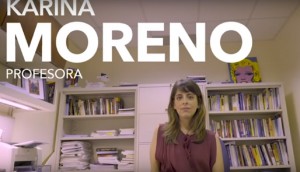
Greg Grandin.
H. M.En CTXT podemos mantener nuestra radical independencia gracias a que las suscripciones suponen el 70% de los ingresos. No aceptamos “noticias” patrocinadas y apenas tenemos publicidad. Si puedes apoyarnos desde 3 euros mensuales, suscribete aquí
¡Hola! El proceso al procés arranca en el Supremo y CTXT tira la casa through the window. El relator Guillem Martínez se desplaza tres meses a vivir a Madrid. ¿Nos ayudas a sufragar sus largas y merecidas noches de fiesta? Pincha ahí: agora.ctxt.es/donaciones
There is a breed of historians that don’t shy away from interpreting the present, but rather on the contrary, keep on drawing lines to it in their work. Greg Grandin is among the most extraordinary of the kind. Professor at New York University, member of the Academy of Arts and Sciences and a regular contributor to “The Nation”, Grandin’s work as a historian is centered on a critical analysis of U.S. Empire. Focusion of “America’s backyard,” as the nation’s leaders like to refer to Latin America, Grandin has been relentless in his dissection of terror policies, funded and supported during decades by the American government. An essential title in his work is his biography of master U.S. foreign policy architect Henry Kissinger, “Kissinger’s Shadow” (2015), as ar “Empire’s Workshop: Latina America, the United states and the Rise of the New Imperialism” (2007) and “The Last Colonia Massacre: Latin America in the Cold War” (2004).
In March 2019, he published his most recent work, “The End of the Myth: From the Frontier to the Border Wall in the Mind of America,” which offers an analysis --equal parts rigorous and innovative-- about the transformation of the idea of the ‘frontier’ in America’s collective imaginary, going back to the nation’s founding, and its reverberations on the border and immigration policies. “Now, rather than the frontier opening up, the border is closing in,” Grandin writes. “The nation’s archetype is no longer the pioneer. The icons now are the ICE raider and border agent.” Connecting (yet again) American foreign policy to the nation’s border, Grandin interprets Donald Trump’s ascent and policies as yet another chapter in the story of a nation that is shaken by its loss of global hegemony.
Part of the effort animating project is to try and challenge the established narratives about America in the age of Trump. There's this embedded idea that this established narrative about Trump's unprecedentedness is very prominent. So, this idea that America's a country of immigrants and that there's this continuous history of welcoming those coming from different parts of the world who, as long as they try to follow the American dream, that they'll be able to get a fair shake, at least, and that Trump somehow breaks away from that tradition. What does that story miss?
I think there's two stories about Trump that bounce off of each other and they reinforce the wrongness of each one. One is that he is completely unprecedented, that the country was beholden to proceduralism, that extremism was relegated to the margins, that it was liberal, it was tolerant. So, Trump is presented in this sense as a rupture, as unprecedented. The flip side of that is that Trump is a fulfillment of a kind of white supremacism that's been present since the creation, that he is not unprecedented, but he is the culmination.
Those two versions, I think miss the sense in which that Trumpism is what happens when the empire ends, when something qualitatively changes in the nature of the US's capacity to project its contradictions outward. The thing about the United States, it's not just any polity. It's not even just any empire. I can't think of any other nation or imperial formation that for so long, even before it was founded in its conception and inception had the idea of expansion built into it..Then, expansion takes various forms, territorial, militarily, market, commercial, economic, cultural, but starting a couple of decades ago, that prerogative, the ability of the United States to organize its domestic politics through the promise of endless growth has ended. It's the endless war, the economic collapse of 2008, but then, hovering it overall is the climate change and the ecological catastrophe we're standing on the precipice of. The promise of growth is no longer.
So, there have been extremists and demagogues in US history, but they have always been relegated to the margins. That relegation was made possible because this frontier universalism that was able to credibly claim a kind of centrist liberalism.
You mentioned the word ‘frontier’. Let's talk about that idea of a frontier and that duality between the frontier and the border. You write that the US was made by its frontier, but today, it is being unmade by its border. In Spanish, it's pretty much the same word.
The frontier, in some ways, is just proxy for a larger expansion that I'm talking about. Certainly going back to the foundation of Anglo society in North America, the idea of moving West and into the woods was part of the experience.
The American Revolution was largely fought against the British Crown's attempt to limit settlement, to pen white settlers east of the Alleghenies, of Appalachia and the American Revolution resisting that. Then, there is this constant “landed” moving forward. It's not necessarily called the frontier. As you mention, the word frontier in the early 19th century basically meant border. It meant a military front. It meant a political boundary. It meant what it means in Spanish, a limit.
It takes on a more existential quality, a civilizational quality, this kind of space in which a certain kind of political culture is created. The theorist of this is Frederick Jackson Turner, a historian who writes in the 1890s. He puts forward a very succinct, short essay in 1893, the Significance of the Frontier in American History. He argues against older historians that tried to locate everything that was good about the United States in Europe and having been brought here, Turner says, No. What's good" –meaning the political equality, this sort of, kind of individualism, a soft mutualism, inquisitiveness, curiosity, buoyancy–“It's created on the frontier. It's created in this free land." From that point forward, the frontier, it becomes one of central myths of American nationalism. Almost every president from that point forward invokes the frontier. It's the place where the United States is moving out in the world. It's the future.
The concept takes on a life of its own after Turner, both expanding and refining its meaning, doesn’t it?
That’s right. Then, the word obviously migrates into other realms, but from the beginning, the frontier is also the border at the same time. All of that violence and Indian removal, all of that moving West is predicated on genocide and ethnic cleansing as well as war against Mexico. There's this violence. Those wars breed a certain kind of racism. White settlers moved over the land claiming a greater freedom by putting down people of color and then defining that freedom in opposition to the people that they put down.
So, in your telling, racism becomes institutionalized through the idea of the frontier, but, in particular, you write about this concept of the “borderfication of national politics.” You use a particular incident in 1931 which is very telling. So, what's that about?
The US is kind of marginalizing racism along a border. The Border Patrol itself is founded in 1924.It's basically a vanguard of Anglo-Saxon supremacy. It's staffed by middle-class men a couple of generations removed from farm life, many of them with experience in the National Guard, of the Texas Rangers or local police, which were already racist, and had invested in them the power to decide who and who wasn't legal. It also gave them power vis-à-vis the landed class, so they could use that racism in order to establish their own status, vis-à-vis the higher-up whites. So, it was structurally racist.
You wrote a very provocative piece or set of pieces about the death of that seven-year-old. Jakelin Caal Maquín (a 7-year-old girl who died in US Customs and Border Protection custody. You asked, “Who Killed Jakelin Caal Maquín?” Let us ask you, who, or what, killed her?
Decades of US economic policy in Central America and the militarization of the border.I wrote a book back in 2005 on Central America about this. One of its centerpieces was the involvement of the United States in designing what was Latin America's first collective disappearance in 1966. At the time, I knew that the person who had sent down was a former Border Patrol agent. He was an Oklahoma sheriff. Then, he became a Border Patrol agent. Then, he wound up working for the CIA to organize death squads. But it turns out a lot of those border patrollers move from the Border Patrol into the CIA. There was a direct connection between Operation Wetback and then, of course, how it circles back in the sense that the violence and displacement in Central America leads to migration. Then they run up into a militarized border.
So, there is another set of moments or institutions that feel important in your telling. Let's flash forward a little bit. You write about the signing of NAFTA sort of coinciding with Operation Gatekeeper and then 9/11 leading to the creation of a real apparatus, including the immigration enforcement force, ICE. What's the significance of those in relation to each other?
There's two tracks that are running along. One is the explicit white supremacist, the nativist, the xenophobes, the KKK, all of the Nazis that are part of the more revanchist right. But then, there is corporate America. NAFTA, to a large degree, comes out of a crisis, like trying to figure out how to organize the North American market. We could talk about the roots of NAFTA and the deep history of it, but one of the things that NAFTA does, it's proposed by Ronald Reagan, it's negotiated by George H.W. Bush, and it's signed into law by Bill Clinton, is that it frees capital to flow back and forth in commodities, but it doesn't have any provisions for labor mobility.
Concurrently with NAFTA, Bill Clinton starts to militarize the border. So, in effect, what those two things are doing is it's trying to capture Mexican labor and immobilize it and paralyze it and not allow Mexican labor the same mobility that capital and commodities have. So, it allows capital to move into Mexico and have access to the cheap labor there. If it had allowed labor to flow as freely as capital and commodities, that would undercut the purpose of the whole deal. You have to understand this is the high point of globalization. This is the high point of the openness. This jewel in the crown of economic globalization. It's just an example of the contradictions within the older model, which were ultimately unsustainable. It gives way to somebody like Trump.
Let's talk about the much-discussed wall. You write about a history of physical barriers on the border and, at the same time, what you dub a “nativist call to arms.” Can you explain how it came about around Vietnam, which, again, goes to your telling about the exterior and the frontier coming back to haunt the U.S. at the border. What is that connection?
Again, this has deep roots in the old order. The wall and building a physical barrier dates back to the late 60s, really early 1970s. You can begin index it to the loss in Vietnam, the beginning of loss in Vietnam. One of Robert McNamara, the Secretary of Defense's plan, was that he wanted to build a barrier across North and South Vietnam in order to stop infiltration from North Vietnam in. He spent millions on that and that failed.
A number of things happened. One is there's changes in immigration law. In some ways, they're bookkeeping changes, so the end of the bracero program in 1965, '64 basically renders hundreds of thousands of seasonal Mexican migrants illegal. The 1965 immigration reform act, which placed quotas for the first time on Mexico. So, all of a sudden these legislation changes created these whole category of criminal, of undocumented workers.
It's Clinton who makes it a national issue. He talks about illegal aliens in a State of the Union Address. He passes a number of laws, the welfare reform law, but also a number of important pieces of legislation, which expand the ‘ilegal’ category and begins to chip away at their civil rights, in limiting due process, at the same time that he begins to spend more and more money on Border Patrol, ICE, and that whole apparatus.
But this idea of the wall still functions as a call to arms that leads us, ultimately, to Trump. How does that play out? Even with some much fencing being built, how does it have that clout?
The wall itself is really a kind of a call only in the precincts of the kind of nativist right. So, it's around 1992 that the Republican Party, because of pressure from the right wing, from Buchanan, begin incorporate in their political platform a call for a physical barrier on the wall. That's the first time. Republicans for decades are torn between two responses. One is to demagogue the issue, to imagine making it harder to vote, to play up on nativism and racism, but there's a wing of the Republican Party that thinks that they win over Latinos. They think that Ronald Reagan liked to often say that, "Mexicans are Republicans. They just don't know it yet."
So, there's increasing fear in the rank and file that if they begin to lose Texas or Arizona or Florida, which have similar demographics to California, then the Republican Party will cease to exist as a national-level political party. When Bush loses his bid to pass immigration reform, I think is really the beginning of the ascension of Trumpism as taking over the Republican Party.
Simultaneously what's happening is what you call the death of the frontier as a myth. You say it happens right around the time, what you call, Obama's “cowboy moment,” the killing of Osama bin Laden. Can you explain what you mean by the implications of a certain kind of exhaustion of this expansion outward.
There's a longer history, but there's the crisis of the 1970s. That's a moment in which Carter is talking about limits. Ronald Reagan and the rise of the new right is a restoration of the ideal of the frontier, pushing into the Third World, just pushing privatization, expansion of corporate power. From Reagan to Clinton, from Reagan to Bush one, to Clinton, the United States kind of ups the ante with each successive president. On the one hand, there's the neo-liberal project. On the other hand, there's the neo-conservative militarist wing. I think with Iraq, the catastrophe that Iraq set loose and then the collapse in 2008, are these turning points. I think, yes, it is true that the US still has 800 military bases all over the world. It's involved in seven wars. It's spending $700 billion a year on its military, but I think that the ideological function of constant war has lost its ability to kind of channel passions into some kind of messianic crusade.
And your point is that that happens at the same time as the neoliberal project collapses in 2008.
Abu Ghraib, I think, is one of these turning points. Then, at the same time, then the economic model collapses. There's been recovery, but it's been a perverse recovery in which inequality seems entrenched. Whole generations can't recover. So, there's those two things and as looming over it, I think is the environmental, the question of sustainability. So, I think those three things rendered the ability of politicians to invoke endless growth as a way to respond to social demands obsolete. There's the sense of hopelessness. I think Trump taps into all of that. He's able to articulate a disillusionment with the established order that I think is profound. I don't think the Democrats realize that ... People don't really link it back to Iraq, but I think Trump is explained, to a large degree, by Iraq.
On Venezuela, you've written a really fascinating piece on how the Right uses Venezuela to redraw political lines. Also embedded in that piece or within that piece is a critique of how the left is unable to articulate an alternative foreign policy vision. What's at play there with Venezuela as it's kind of latest iteration?
The Venezuela crisis has multiple levels. It depends on what your level of analysis is. On some level, it's about oil, obviously. It's about oil as power, not just oil as profit generating. It's who controls oil. Every time it makes a bid for a kind of global push and loses that bid, it comes back and it turns back to Latin America to regroup. The New Deal did that and then the New Right did that after Vietnam. That's what Iran-Contra was about. That was what Central America was about.
It is true Trump is trying to get out of Afghanistan and extricate from the disasters there. It's been a catastrophe. So, now you turn back to Latin America. It's not just Venezuela. It's a reordering of the whole continent. Brazil, the rise of Bolsonaro, a fascist, an alliance with more conservative elements. You just think about 10 years ago, the whole region was stood as a challenge to US hegemony and power on economic, around the free trade treaty of the Americas, around questions of rendition, around Middle Eastern policy and on Syria, but also Iran and Israel, Palestine. Now, you've had an 180 degree turn in which the region has just fallen back squarely into US's sphere of influence. It's about China. I think it's about putting down a marker about China.
So, Then, it's an ideological thing. It's one of the things that I argued in that piece is that foreign policy is the place where hegemony is established, not over other nations, within this country. It's the way moral … So, as a way of attacking socialism here, which seems to be on the rise. All Republicans have to do is point to Venezuela and say, "That, see. This is what …" It's about establishing kind of what a normative vision of society should look like. The political coalition that dominates foreign policy dominates domestic policy
Let’s end by looking ahead. There has been very vibrant opposition to his immigration policies on the streets across the country, and leaders such as Alexandria Ocasio-Cortez, Ilhan Omar and many others succeeded on a platform that appears to be much to the left of what Democrats have historically advocated on immigration, with calls to Abolish ICE being central to their platform. They also question some of the bipartisan gospel of U.S. foreign policy in the past half century, from the relationship with Israel to support of Death Squads in the dirty wars in Central America. Given this political terrain, what is to be done?
It’s good that the left wing of the Democratic Party is developing an internationalist vision, because, as I said, foreign policy is the arena in which, to put it in Gramscian terms, hegemony is established – not over other countries, but within this one – the place were moral ideas over how best to organize society get worked. To dominate foreign policy is key to dominating domestic politics. But there is a trap for the rising new left: in US history, there has never been a period of political reform that hasn’t been dependent on political expansion. The nation was founded on the idea that expansion was necessary to achieve and protect social progress. Over the centuries, that idea was realized, again and again, through war.
But those days are gone. No more cn reform ride on the back of national power. The link between liberal progress, even mildly conceived, and expansion is broken. They have to figure out a way to win – to build a governing coalition – by disassembling the rotting foundations of national power as they now exist: they have to end the wars, close the bases, euthanize the fossil fuel industry, fetter finance, and bankrupt the military budget. It won’t be easy.
¡Hola! El proceso al procés arranca en el Supremo y CTXT tira la casa through the window. El relator Guillem Martínez se desplaza tres meses a vivir a Madrid. ¿Nos ayudas a sufragar sus largas y merecidas noches de...
Autor >
Álvaro Guzmán Bastida /
Autor >
IGNASI GOZALO-SALELLAS /
Autor >
Héctor Muniente
Suscríbete a CTXT
Orgullosas
de llegar tarde
a las últimas noticias
Gracias a tu suscripción podemos ejercer un periodismo público y en libertad.
¿Quieres suscribirte a CTXT por solo 6 euros al mes? Pulsa aquí







